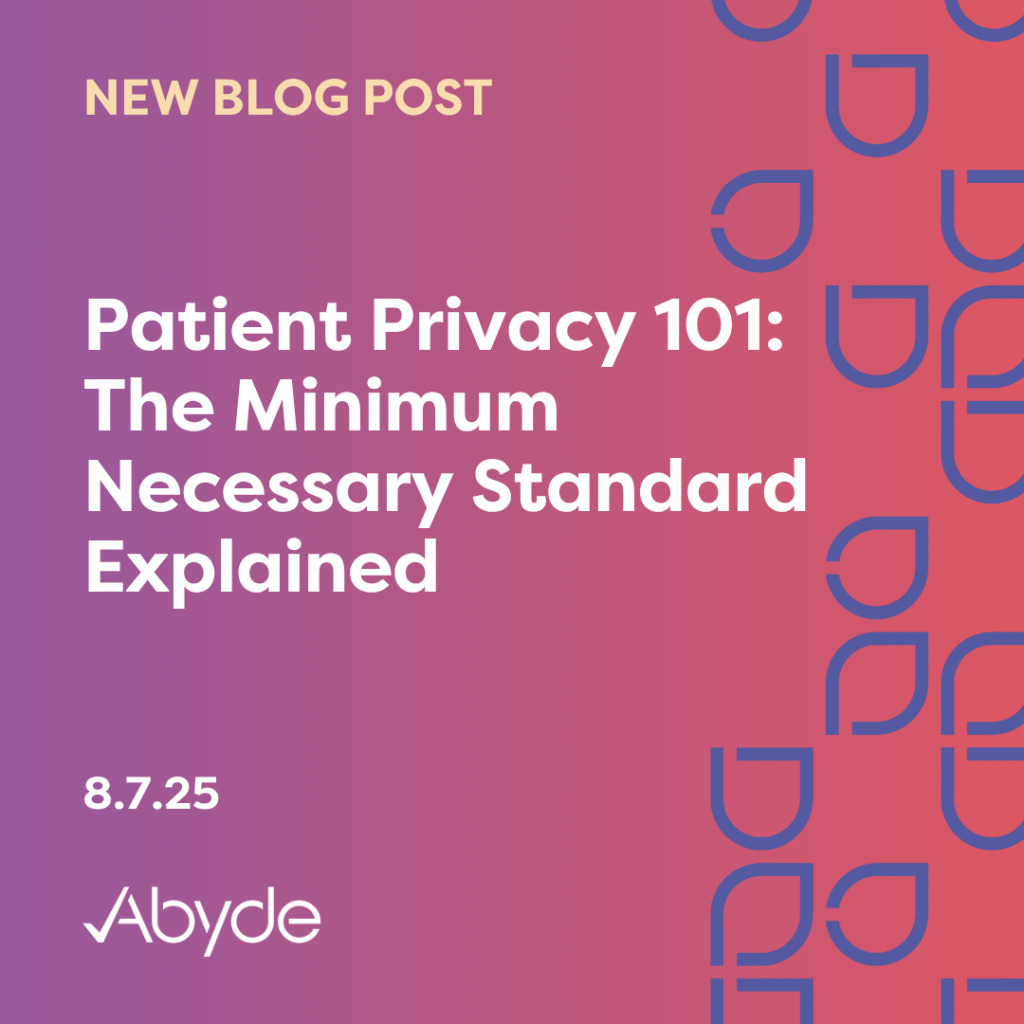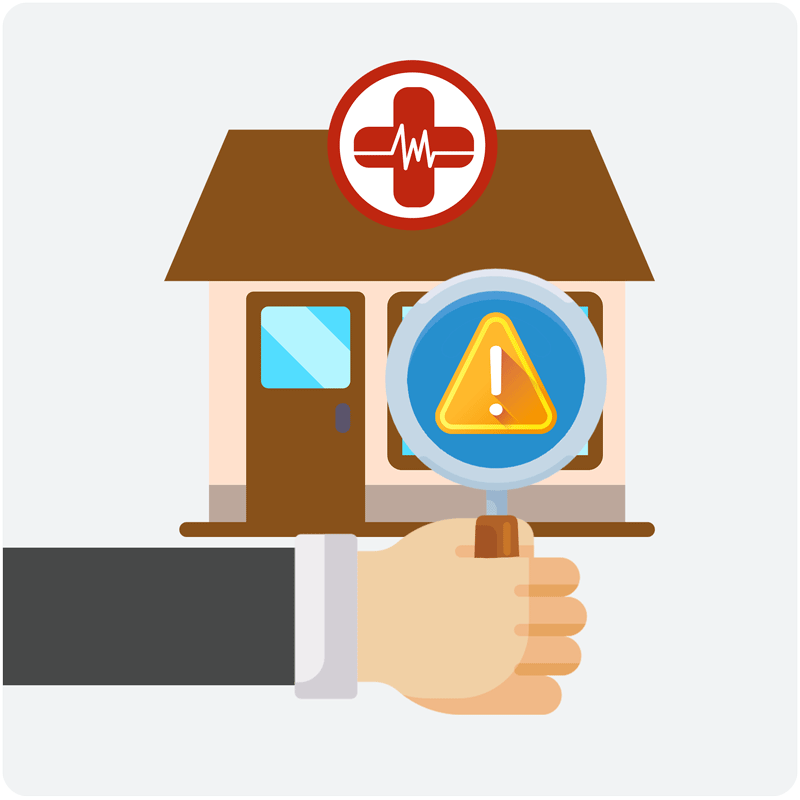August 7, 2025 Under HIPAA, healthcare practice staff must keep a secret. This means everyone with access to patient data, from doctors to receptionists, can’t share any information about a patient. While it might feel enticing for a nurse to tell their friends about an old high school bully coming into their practice with a rash, and revenge might feel sweet, it’s a total HIPAA no-no. One of the pillars of HIPAA is the Privacy Rule, which dictates when and if Protected Health Information (PHI) can be shared. The Privacy Rule keeps patient data secure and allows the best care, with patients knowing their information will remain confidential. However, sometimes information needs to be shared. This is where the Minimum Necessary Standard comes in. With this rule, healthcare providers and their Business Associates can share PHI if it’s vital to complete work tasks. Safeguarding confidential information upholds the integrity of your practice and allows patients to feel comfortable when addressing health concerns. Your practice must follow HIPAA to keep patient data safe and secure. What is the Minimum Necessary Standard? All in the name, the Minimum Necessary Standard defines how HIPAA-regulated entities can share information. Depending on the situation, more information might be warranted to be shared compared to others. The easiest way to explain the HIPAA Minimum Necessary Standard is to compare it to ordering pizza. When you order a pizza for delivery, you only provide the minimum necessary information: your name, what you want to eat, and your address. You wouldn’t share details like what you ate for breakfast or the names of everyone in your house because that information isn’t needed for the delivery. In a healthcare setting, while not as cheesy, the same principle applies. A front-desk receptionist, for example, needs access to a patient’s basic information to confirm an appointment. They don’t need access to the patient’s full medical history. The minimum information required for their job is scheduling and patient identification, not the patient’s back surgery details. The HIPAA Minimum Necessary Standard ensures that everyone, from the front desk to doctors, to even your vendors, can only access the PHI they absolutely need to do their job. In some situations, more information can be shared more easily. These exceptions include disclosures for treatment purposes, such as when a doctor needs a patient’s complete medical history to provide proper care. Your practice can share PHI with the patient directly, or someone with explicit authorization from the patient, or in a public emergency. Finally, disclosures may also be required by law. Simplifying the Minimum Necessary Standard Your staff must uphold the security of PHI. By following the HIPAA Privacy Rule, you stay compliant and build a successful practice. When patients feel confident that their records are safe, they’ll trust you and feel empowered to choose your practice. It’s a serious responsibility. With the right solution, staff can be appropriately trained to handle health records. Smart software can streamline training for your practice and provide dynamically generated policies and procedures for all staff to access and review whenever they have a question regarding the use of PHI. Meet with a compliance expert today to learn more about protecting your practice and patients.
Top 4 HIPAA Violations Your Practice Should Avoid
September 4, 2020 Even with everything else going on in the world today, HIPAA violations are still making headlines. While these news stories reinforce that the Office for Civil Rights (OCR) hasn’t let up on HIPAA enforcement, they also provide great examples of what not to do when it comes to your own practice. Based on these violations and recent OCR investigation data, we’ve compiled the top four types of violations investigated by the OCR: 1. Impermissible Uses & Disclosures The reigning champion of HIPAA violations over the past 5 years – impermissible uses or disclosures – covers any access, use, or sharing of protected health information (PHI) that is done in a manner not permitted under HIPAA and compromises the security or privacy of a patient’s sensitive information. Common culprits include: Having the right policies in place outlining the proper ways staff may use and disclose PHI is key to ensuring your practice doesn’t join the growing list of improper use violators. 2. Missing Physical, Technical and Administrative Safeguards HIPAA law requires practices to implement safeguards to ensure PHI is protected and secured. These safeguards include: Failing to implement key safeguards is what gets practice’s into trouble, which is why it is essential to perform in-depth as well as ongoing Security Risk Analyses in order to properly identify which safeguards are missing 3. Improper Access Your data library shouldn’t be fair game to every employee regardless of their role. Even if just glancing at a patient’s information, any access to patient information that is not necessary to complete a specific job function is a violation of HIPAA. With remote work becoming more and more common, we can expect improper access violations to rise as employees use data in less secure environments and with less supervision than there would be in a typical practice setting. Appropriate access is featured heavily in HIPAA, and it’s important to limit and document your access roles. It’s not just internal access to PHI that can get your practice into trouble. There are specific guidelines for providing patients with medical records as well, and while this may seem straightforward 51% of providers fail to comply with HIPAA Right of Access laws. Understanding what Patient Right of Access laws entail is important to keeping your patients happy and avoiding a problem with the OCR. 4. Violations of Minimum Necessary Requirement Less is more when it comes to sensitive health information. Only the minimum information necessary should be provided when PHI is requested, accessed, or disclosed. Violations of this requirement could include providing additional information such as previous medical conditions that may not pertain to the actual purpose of the task at hand. Having proper training and documented policies in place that define what information is considered necessary is an essential piece to protecting your patient’s information and steering clear of a HIPAA violation. A Violation is Just a Slap on the Wrist, Right? While a violation in any of these areas could be minor, a HIPAA violation fine ranges anywhere from a few hundred to a million dollars based on various factors such as: The biggest fine so far? $16 million in a single settlement. Monetary fines aren’t the only thing you have to worry about if you find yourself facing a HIPAA violation. Jail time and extensive corrective action plans involving extra oversight and administrative work are real possibilities if a violation is found. So How Can You Best Avoid a HIPAA Violation? Many HIPAA violations can be attributed to a lack of employee education on what’s required under federal law. Violations aren’t usually intentional or malicious, which is why it’s so important to create a culture of compliance within your organization and promote good habits. Keeping up with your HIPAA compliance program and staying updated on any changes to federal regulations is the best way to keep your patients’ information secure and avoid ending up as another HIPAA headline.

